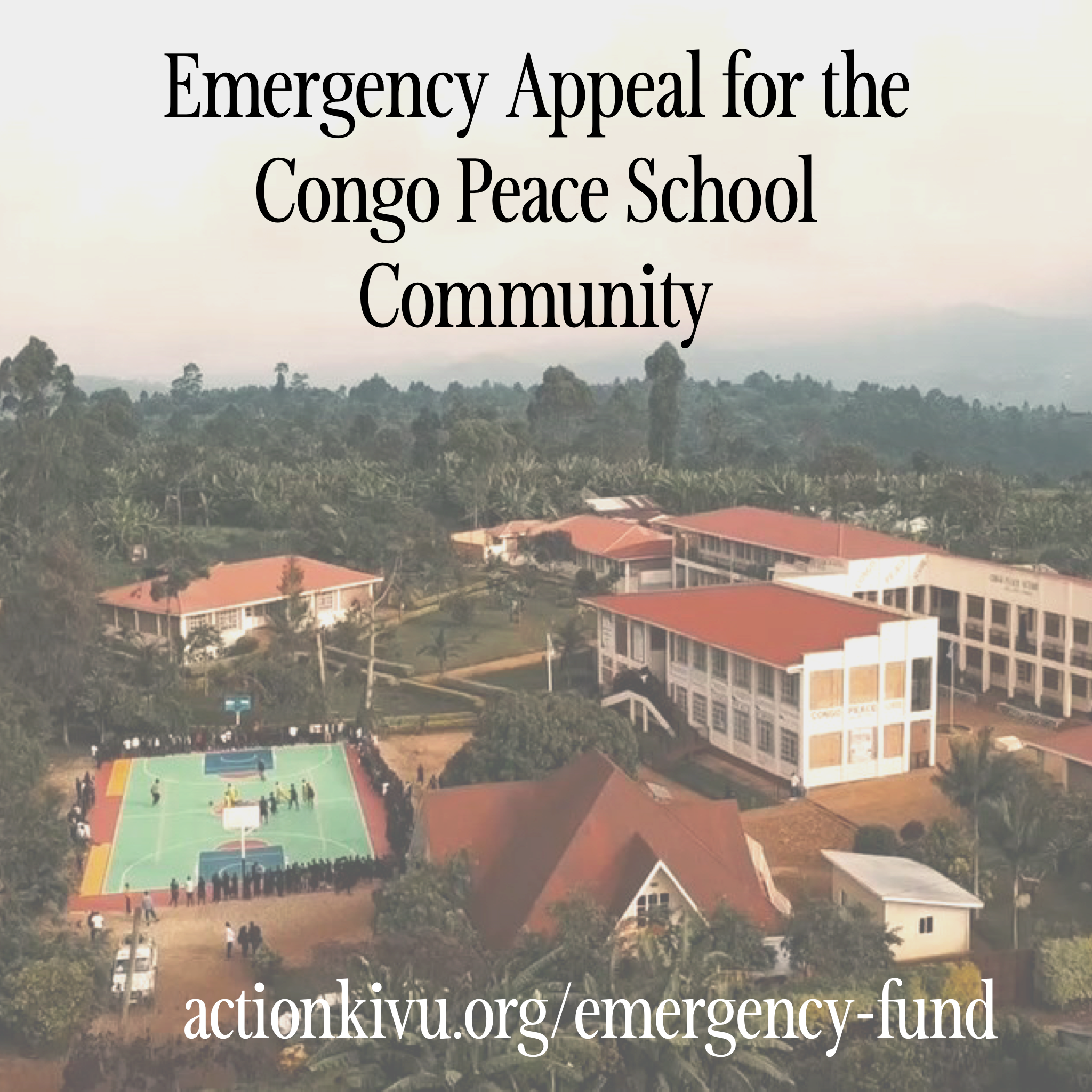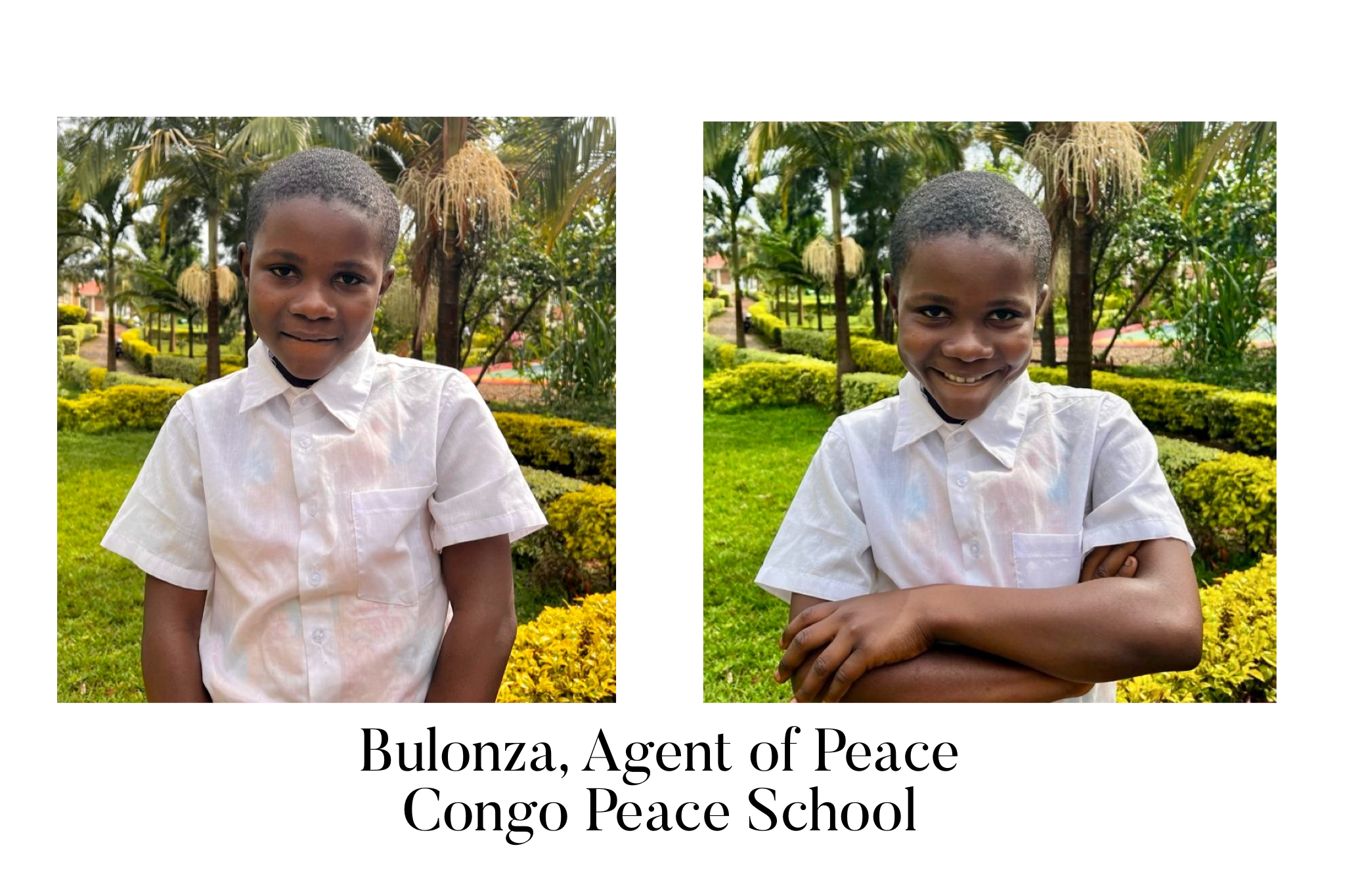This moment captured in time has stayed in my mind’s eye the last week, seeing preschool students at the Congo Peace School playing with puzzle pieces. Thinking of the overwhelming puzzle we are trying to solve – how to overcome violence with peace, discord with nonviolent conflict resolution. How to break this global cycle of endless wars and division.
It’s not a light task, or topic. And to be honest, preparing this newsletter I have been struggling with trying to find a connection to the active hope we believe in to be real, and powerful. It feels like its own puzzle: how to fit the pieces of the terror and trauma these little ones are surrounded by together with the safety of the Peace School, with the space created for them to play, to learn to read and write, to practice healthy disagreements and the sharing of resources. To practice how to transform and heal their trauma, so that they don’t take it out into the world for it to hurt others, and feed the cycle of violence.
As our visionary leader Amani Matabaro often reminds us, trauma that is not transformed is transferred.
And as we view the cycles of violence, we hold the knowledge that joy and laughter are also contagious. One of the healing practices at the Peace School is laughter therapy.
In the midst of the following horrific news from Congo, we find a place to fit in the puzzle piece of active hope that a peace plan is underway, and that it will be implemented and vigorously monitored by our global community, using the power of people paying attention and calling out human rights violations. By calling our representatives. By calling companies that source the minerals from Congo and reminding them our purchases fuel their wealth as well.
A friend recently gave me the gift of the mantra: Action Alleviates Anxiety. When my anxious thoughts and worries and the barrage of bad news begins to make my heart race, I remember it and take action. And it does help.
Know that you, providing funds for the Congo Peace School to continue this transformational project, that you, engaging with the people in Congo, sharing their stories, sharing the news – that you are taking action to create more peace in the world.
We recently updated our Congo Peace School (CPS) video with information about the war and M23, and added a portion of testimony from the CPS Nest preschool students – please watch here, and share with others.
::RECENT NEWS::
· A peace deal: “Officials from Rwanda and the Democratic Republic of Congo have reached a draft agreement aimed at ending decades of conflict.
“The breakthrough, mediated by the US and Qatar, provides for the ‘disengagement, disarmament and conditional integration’ of armed groups fighting in eastern DR Congo. Coverage from the BBC here. (See a response from fellow civil society leaders and Amani’s take below).
· Could Africa’s Forever War Finally End? How U.S. Diplomacy Could Resolve the Conflict Between Congo and Rwanda – Foreign Affairs piece here (one free story before paywall)
· A devastating attack on civilians in a part of South Kivu (not near the Congo Peace School) on Sunday, June 22.
DRC government communique linked here, and translated from French into English below:
DEMOCRATIC REPUBLIC OF CONGO
ARMED FORCES GENERAL STAFF
The Parte Punale
PRESS RELEASE NO. 17 OF JUNE 23, 2025.
The Armed Forces of the Democratic Republic of Congo inform national and international opinion of the summary execution of 17 civilians by the RDF/AFC/M23 coalition on Sunday June 22, 2025 at around 6.30pm in the village of MUNZINZI, in the Chefferie of NGWESHE, in the territory of WALUNGU, Province of South Kivu. Several houses were also set on fire, and the terrorized civilian population was forced to take refuge in the nearest military positions.
The population is accused of collaborating with the Armed Forces and the WAZALENDO by the enemy, following the failure and enormous losses suffered in their attempts to attack the positions of the loyalist forces.
The Armed Forces of the Democratic Republic of Congo condemn this umpteenth pogrom and call on the population to be vigilant.
Kinshasa, June 23, 2025:
EKENGE BOMUSA EFOMI Sylvain
Major General
Contact: +243 971 800 424. Email: sfoml.elnge@amali.com
· DR Congo: M23 Armed Group Forcibly Transferring Civilians – Rwanda as Occupying Force May be Responsible for War Crimes (Read the Human Rights Watch report here.)
· DR Congo Investigations Needed More Than Ever: UN Funding Crisis Should Not Delay Commission of Inquiry (Read the Human Rights Watch report here)
· A statement of response to the proposed peace agreement from our friends in peace at Pamoja kwa Amani (Together in Peace) – linked here in English, and here in French.
· Amani’s thoughts on the above statement in response to the proposed peace deal: “In addition to the peace agreement between the DRC and Rwanda under the facilitation of the US administration, there is a huge need to organize an internal Congolese dialogue bringing different political, social figures, forces, and voices to the table in order to work for the people of Congo. Addressing internal local Congolese issues (such as access to clean water, healthcare, exposing and eradicating corruption, free and fair elections, etc.) by using the truth and love for Congo as tools to lean on, we learn to engage in dialogue even during moments of disagreements in political views. From a nonviolence perspective, Martin Luther King Jr is totally right: ‘choosing love, even in the face of adversity or hate, is a more sustainable and ultimately more powerful path.’”
To stay informed of the latest from DRC, please also subscribe to PAEMA’s DRC News Monitor, a bi-weekly roundup of the news.
A note of hope from one of the Congo Nest preschool teachers, when asked about the importance of the early childhood education program during a time of war:
“During these moments of war, the preschool program is so important. We see how the children come to school with high symptoms of trauma, they come with fear, it is a very difficult moment in their lives but the program is helping them especially when it comes to playing and working together. During these moments of war, the Nest program is the only place the children feel safe.
“We continue teaching them about the no retaliation practices, forgiveness … in the middle of war, we are teaching and preparing future ambassadors for peace.” –Preschool teacher Bulonza
When we zoom out from Congo to a bigger picture of the globe, and all our places in it, we see how these students fit into our larger society – as we are all planting seeds of peace and healing for them to grow into adults with the tools to be agents of peace in our world.
We continue to send funds to the school, as well as emergency funds to meet the increasing needs of the people and families surrounding the school, who are such an integral part of its vibrancy and sense of community and safety. Please share our work with others, so we can continue to grow and deepen the impact we are all making!







































